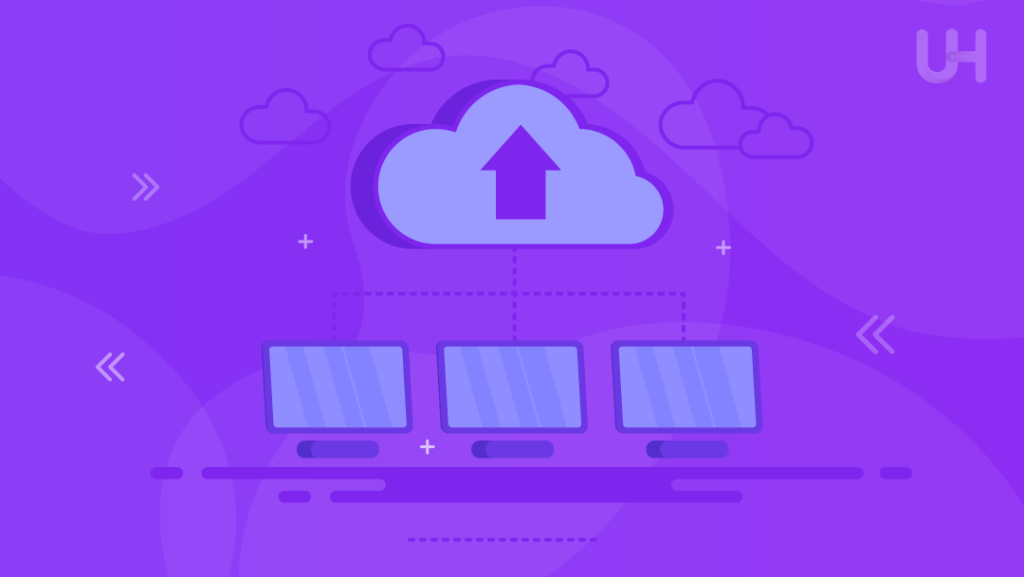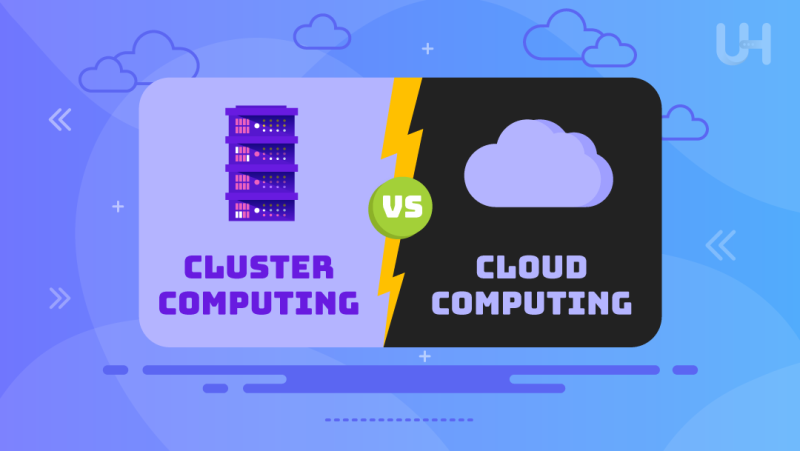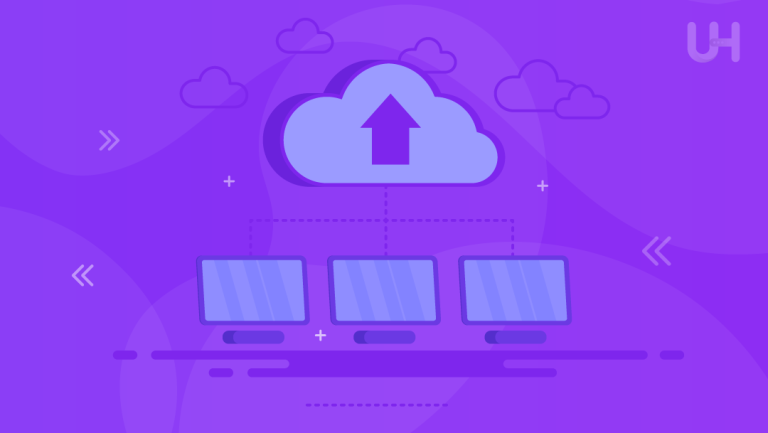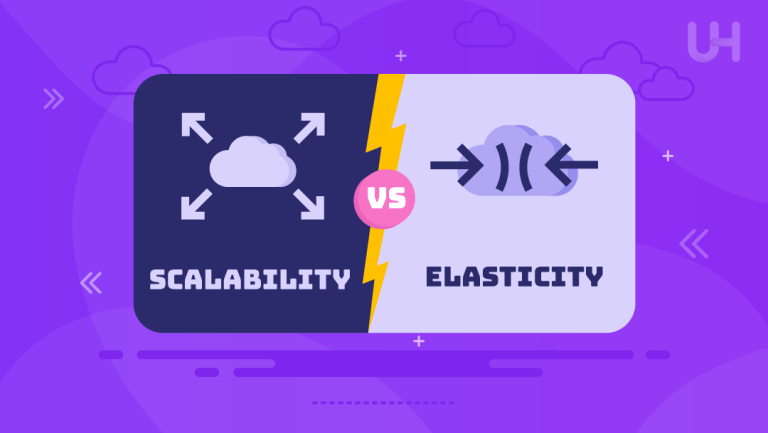Nowadays, as the stride of development is accelerating for various ventures in the digital world, so is their need for higher technologies in handling, managing, and storing data. The two much-talked-about solutions to have emerged of late are cluster computing and cloud computing. Although both provide enormous computing powers, the former aimed at a different target than the latter, each having its specific architecture. Differentiating cloud computing vs cluster computing should be considered with a viewpoint of making strategy decisions that accomplish business goals.
In this article, we will differentiate cloud and cluster computing, understand the definitions of both solutions and discuss the advantages and practical use cases for both solutions to help you make a choice for your needs.
What is Cloud Computing?
Cloud means servers, which are online, store software and databases worldwide; cloud computing allows its users to use files and conduct applications on any kind of device anywhere without the server’s physical involvement and local software installation. The example will be this: if one changes their smartphone and wants to start using Instagram all over again, they will not have a problem getting access to his account and everything that he has posted to this date. It’s also applied to cloud-based e-mail platforms like Microsoft Office 365 and Gmail or to cloud storage services such as Google Drive and Dropbox.
Cloud computing decreases the IT costs and responsibilities for an organization, as the vendors maintain the servers and upgrade them. Small businesses also benefit from the elimination of the need for physical servers and other data center infrastructure and can let their employees and customers work on a centralized platform from different locations.
Key Features of Cloud Computing
- On-Demand Access: Resources are accessible anytime, anywhere, enabling flexible and efficient work whether you’re in the office, at home, or on the go.
- Scalability: Easily adjust your resource capacity to meet changing demand, ensuring optimal performance without excess costs.
- Cost-Efficiency: Pay only for the resources you use, making it budget-friendly and allowing for better allocation of funds toward strategic investments.
- Managed Services: Service providers handle maintenance, updates, and support, allowing your team to focus on core business activities while keeping systems secure and running smoothly.
Advantages of Cloud Computing
- Cost-Effective Model: Cloud computing offers a cost-effective pay-as-you-go model, enabling organizations to pay only for the resources they use. This reduces initial capital expenditures and allows for scalable budgeting, making it an economical choice for businesses of all sizes.
- Global Accessibility: Cloud computing enables access to data and applications from anywhere, enhancing collaboration among remote teams. It overcomes physical infrastructure limits and includes data privacy measures, helping businesses maintain productivity regardless of workforce location.
- Scalability: Cloud service with secure offshore server hosting offers scalable solutions that adapt to an organization’s needs, allowing companies to quickly increase resources during peak times and reduce them when demand is low. This flexibility improves operational efficiency and supports growth while minimizing unnecessary costs.
Disadvantages of Cloud Computing
- Dependency on Internet Connectivity: Cloud computing relies on a stable internet connection. Slower or disrupted service can hinder access to critical applications and data, especially for businesses in areas with inconsistent internet, potentially disrupting operations.
- Potential Security Risks: Despite strong security measures from cloud providers, off-site data storage can expose organizations to risks like data breaches and unauthorized access. It’s essential to evaluate security protocols and implement additional protections such as data encryption and two-factor authentication.
- Limited Control Over Infrastructure: Using cloud services often means ceding control over IT infrastructure, which can complicate customization and flexibility. Businesses may struggle to adapt their cloud environment to specific needs, impacting resource management.
What is Cluster Computing?
Cluster computing is a form of computational architecture wherein a large number of computers, usually called nodes, are interconnected through a high-speed Local Area Network. This interlinking of resources from each node forms one big, powerful computing system. The primary objective of cluster computing is to achieve enhanced performance and higher availability by putting multiple computers together in order to handle jobs more efficiently with increased reliability.
Key Features of Cluster Computing
- Scalability: Cluster computing with reliable VPS hosting offers seamless scalability, allowing for easy addition of new nodes to enhance performance and capacity as organizational demands grow.
- High Availability: Designed with redundancy, cluster computing ensures high availability. If a critical component fails, the system can quickly switch to a backup, minimizing downtime and maintaining service access.
- Task Distribution: Efficient task distribution optimizes resource utilization by intelligently balancing workloads across nodes. This helps maintain high performance, reduce bottlenecks, and accelerate task completion.
- Fault Tolerance: Fault tolerance enhances reliability, allowing remaining nodes to take over tasks if a node fails. This ensures operational continuity and data integrity, minimizing the impact of individual outages on overall performance.
Boost Your Online Presence with Top Server Hosting!
Are you prepared to boost your digital footprint? Switch to UltaHost’s server hosting for lightning-fast performance, robust security, and exceptional scalability, all customized to meet your online needs.
Advantages of Cluster Computing
- High Computational Power: Cluster computing utilizes multiple interconnected computers for parallel processing, enhancing computational capability and enabling efficient handling of complex calculations and large datasets. This distributed setup allows for workload sharing, resulting in improved performance and faster execution times compared to single-machine solutions.
- Fault-Tolerant Systems: A significant advantage of cluster computing is its fault tolerance. If one or more nodes fail, the cluster can continue operating by redistributing workloads among the remaining servers, minimizing downtime and data loss.
- Ideal for Mission-Critical Workloads: Cluster computing is perfect for applications needing high availability and reliability, such as scientific research and financial services. Its combined power and redundancy enable efficient processing of critical workloads while allowing for dynamic resource scaling to meet varying demands.
Disadvantages of Cluster Computing
- Expensive Setup and Maintenance: Establishing a cluster computing system requires a significant financial investment, including hardware, networking equipment, and software licenses. Ongoing maintenance costs, such as updates and hardware replacement, can quickly accumulate, making it less accessible for smaller organizations with limited budgets.
- Limited Scalability: Although cluster computing aims to enhance scalability, expanding the cluster can lead to issues with load balancing, resource management, and network latency. Scaling often requires substantial software adjustments or architectural changes, which can introduce complexity and downtime.
- Requires Specialized IT Expertise: Managing a cluster computing environment necessitates technical expertise. Organizations may need to hire specialized personnel familiar with distributed systems and networking. This requirement can pose challenges in recruitment and lead to higher operational costs, especially in high turnover environments.
Difference Between Cloud Computing and Cluster Computing

Here is the table of comparison between cloud computing vs cluster computing:
| Aspect | Cluster Computing | Cloud Computing |
| Infrastructure | Physical servers are connected in a cluster. | Virtual servers hosted on the internet. |
| Scalability | Limited by physical infrastructure. | Virtually unlimited scalability. |
| Cost | High initial setup cost. | Pay-as-you-go pricing model. |
| Accessibility | Limited to on-premises network. | Accessible over the internet. |
| Management | Requires in-house management. | Managed by cloud service providers. |
| Fault Tolerance | Managed within cluster nodes. | Managed across distributed servers. |
| Flexibility | Fixed hardware and resources. | Dynamic resource allocation. |
Cloud Computing vs Cluster Computing: What Should You Choose?
When deciding between cloud computing vs cluster computing, it’s important to understand the appropriate context for each option. Cluster computing is best suited for high-performance tasks within a localized environment. It is particularly effective for scientific research, complex simulations, and data analysis. By connecting multiple computers as a single system, cluster computing maximizes processing power, making it ideal for research institutions that require substantial resources to handle large-scale projects.
Where you need scalable, flexible, and cost-effective IT infrastructure, Cloud Computing comes into play. Cloud solutions use online resources to scale up and down with demand without investment in hardware. This model helps companies with fluctuating demand. It enables efficient remote access to applications and data, supporting innovation and growth.
Conclusion
Both cloud computing vs cluster computing play critical roles in the modern digital ecosystem. While cloud computing provides scalability and cost efficiency, cluster computing excels in localized high-performance tasks. For many businesses, a hybrid approach combining a cluster in cloud computing offers the best of both worlds.
In cloud computing, seamless integration and dependable support are essential. UltaHost delivers industry-leading Cloud Storage VPS, guaranteeing that your data stays safe and easily accessible on any platform. Transform your cloud computing journey today!
FAQ
What is the main difference between cloud computing and cluster computing?
Cloud computing relies on virtual servers over the internet, while cluster computing uses interconnected physical servers.
Can cloud computing replace cluster computing?
In some cases, yes. However, cluster computing is still essential for highly specialized tasks.
Is cluster computing more secure than cloud computing?
Cluster computing offers more control, but cloud security measures have significantly advanced.
Which is more cost-effective: cloud computing or cluster computing?
Cloud computing is generally more cost-effective due to its pay-as-you-go model.
Can cloud computing handle large-scale scientific simulations?
Yes, with cloud-based clusters, it’s possible to handle such workloads.
Is cluster computing outdated from cloud computing?
No, it remains relevant in specialized fields like scientific research and simulations.
Which hosting plan is best for a cloud-based cluster setup?
Dedicated Hosting or VPS Hosting are excellent choices for cloud-based clusters.










